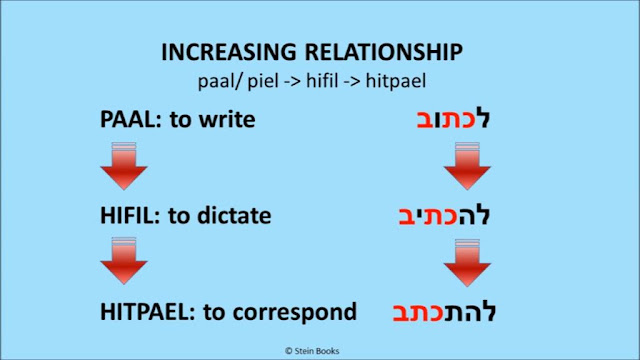I have been asked many times by Christians who want to learn Hebrew but they don't want to spend time studying the grammar.
Let me give you an illustration why learning the grammar is important even in English.
Let's say I have a friend who tells me,
"Stephen, I am coming to your house yesterday."
I can interpret it as, "Wow! Great! I will cook you a meal! What would you like to eat this time?"
Not knowing that he meant, "I came to your house yesterday" and because of that, he is not planning another visit to my house.
How has the grammar helped him and you to communicate? It would lead to miscommunication, misinterpretation and a lot of frustrations, wouldn't it? What if I had prepared a whole banquet for you thinking that he will be coming to my house?
That's why, if proper grammar is necessary, a good understanding of Hebrew grammar is also very important!
* * * * *
- Why do you study English grammar?
- Why is it important for you to know how to differentiate the tenses. For example
- "I will buy the food today" is the future tense
- "I have already bought a lot of food" means you have done the action.
- What about words like 'broke' or 'shattered'? Which word gives you a stronger intensity? For example,
- "The glass broke when it fell on the floor."
- "The glass was shattered into pieces!"
- Your girlfriend tells you, "I am going to cook for you on Sunday". Today is Monday. Do you turn up in her house just because you heard her saying, "cook for you"?
When you want to get the most out of your Hebrew Old Testament or Greek New Testament, you need to know the basic grammar first before you can do a good job at your exegesis.
 A sister-in-Christ once remarked that the Hebrew word for prayer is a hithpael. She was enthusiastic to share with me. "God used the hithpael form of the word because it is a very intensive and reflexive action between two parties involved in a believer's prayer. God speaks to the believer just as much as the believer speaks to God."
A sister-in-Christ once remarked that the Hebrew word for prayer is a hithpael. She was enthusiastic to share with me. "God used the hithpael form of the word because it is a very intensive and reflexive action between two parties involved in a believer's prayer. God speaks to the believer just as much as the believer speaks to God."There you go! That's the basic Hebrew grammar. Hithpael is one of the verbal stems of Hebrew verbs or the binyanim. There are seven binyanim, which represents two dimension: the Voice (either active or passive) and the intensity of relationship whether it involves one or more parties (hence, the difference in the English words that we know as 'write', 'dictate' and 'correspond'.

Without understanding the basic grammar, how can anyone truly study the Hebrew Bible and be inspired by the word of God itself? There are so many things that I can share which will amaze you as I continue to study the language and applying it in my reading of Scriptures.
I hope you see the importance of learning the basic Hebrew (and Greek) grammar so that you can do your Bible studies in the original languages. With basic Hebrew grammar, great scholars have been able to discover new insights and write books that impacted many lives. For this reason, I encourage people to plug into a seminary-level Hebrew course. Read this.







No comments:
Post a Comment